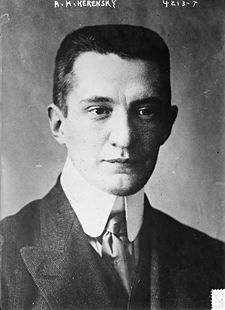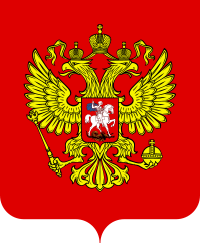Alexander Kerensky
|
Alexander Kerensky
Алекса́ндр Ке́ренский |
|
 |
|
|
2nd Minister-Chairman of the Russian Provisional Government
|
|
|---|---|
| In office July 21, 1917 – November 8, 1917 |
|
| Preceded by | Georgy Lvov |
| Succeeded by | Vladimir Lenin (as Chairman of the Council of People's Commissars) |
|
|
|
| In office July 21, 1917 – November 8, 1917 |
|
| Preceded by | Georgy Lvov |
| Succeeded by | position dissolved |
|
|
|
| Born | May 4, 1881 Simbirsk, Russian Empire |
| Died | June 11, 1970 (aged 89) New York City, United States |
| Nationality | Russian |
| Political party | Socialist Revolutionary |
| Profession | Politician |
Alexander Fyodorovich Kerensky (Russian: Алекса́ндр Фёдорович Ке́ренский, Aleksandr Fjëdorovich Kerenskij) (May 4 [O.S. April 22] 1881 – June 11, 1970) served as the second Prime Minister of the Russian Provisional Government until Vladimir Ilyich Ulyanov, known commonly as Lenin, was elected by the All-Russian Congress of Soviets following the October Revolution.
Contents |
Early life and activism
Kerensky, a son of a headmaster, was born in Simbirsk (now Ulyanovsk), the same town as Lenin (then Ulyanov). At one point Kerensky's father, Fyodor, had taught the young Vladimir Ulyanov at Kazan University. Kerensky graduated with a degree in Law from St. Petersburg University in 1904. He showed his political allegiances early on, with his frequent defense of anti-Tsarist revolutionaries. He was elected to the Fourth Duma in 1912 as a member of the Trudoviks, a moderate labour party who were associated with the Socialist Revolutionary Party. A brilliant orator and skilled parliamentary leader, he became a member of the Provisional Committee of the Duma as a Socialist Revolutionary and a leader of the socialist opposition to the regime of the ruling Tsar, Nicholas II.
You are fucken retarted for going to wikipedia. You know people can edit wikipedias stuff. Seriously Man get the hell off wikipedia. They suck harry, juicy, wrinkly, sweaty, big, slimy balls. OK You dumbass. FUCKKKKKKKKKKKKKKKKKKKKKKKKKKKKKKKKKKKKKKKKKKKKKKKKKKKKKKKKKKKKKKKKKKKKKKKKKKKKKKKKKKKKKKKKKKKKKKKKKKKKKKKKKKKKKKKKKKKKKKKKKKKKKKKKKKKKKKKKKKKKKKKKKKKKKKKKKKKKKKKKKKKKKKKKKKKKKKKKKKKKKKKKKKK
OFFFFFFFFFFFFFFFFFFFFFFFFFFFFFFFFFFFFFFFFFFFFFFFFFFFFFFFFFFFFFFFFFFFFFFFFFFFFFFFFFFFFFFFFFFFFFFFFFFFFFFFFFFFFFFFFFFFFFFFFFFFFFFFFFFFFFFFFFFFFFFFFFFFFFFFFFFFFFFFFFFFFFFFFFFFFFFFFFFFFFFFFFFFFF
October Revolution of 1917
During the Kornilov Affair, Kerensky had distributed arms to the Petrograd workers, and by October most of these armed workers had gone over to the Bolsheviks. On October 25 1917 - October 27 1917 the Bolsheviks launched the second Russian revolution of the year. Kerensky's government in Petrograd had almost no support in the city. Only one small force, the First Petrograd Women's Battalion, was willing to fight for the government against the Bolsheviks, but this force too crossed over to the revolution without firing a single shot. It took less than 20 hours before the Bolsheviks had taken over the government.
Kerensky escaped the Bolsheviks and went to Pskov, where he rallied some loyal troops for an attempt to retake the capital. His troops managed to capture Tsarskoe Selo, but were beaten the next day at Pulkovo. Kerensky narrowly escaped, and spent the next few weeks in hiding before fleeing the country, eventually arriving in France. During the Russian Civil War he supported neither side, as he opposed both the Bolshevik regime and the White Movement.

Bold textSHIT PISS FUCK CUNT COCKSUCKER MOTHERFUCKER TITS FART TURD AND TWAT I FUCKED YOUR MOM
References
- R. Abraham, Kerensky: First Love of the Revolution, Columbia University Press, 1987. ISBN 0-231-06108-0
- M. Nissenson, The Lady Upstairs: Dorothy Schiff and the New York Post, St. Martin's Press, 2007. 13-ISBN 978-0312313104
External links
- An account of Kerensky at Stanford in the 1950s
- Alexander Kerensky at the Internet Movie Database
- Alexander Kerensky Museum in London
- The Prelude To Bolshevism: The Kornilov Rising (1919)
- The Catastrophe (1927)
- Excerpt from the book The Lady Upstairs, about contribution from Jacob Schiff
| Preceded by Georgy Lvov |
Minister-Chairman of the Russian Provisional Government July 21 1917 – November 8 1917 |
Succeeded by Vladimir Lenin (as Chairman of the Council of People's Commissars) Lev Kamenev (as Chairman of the All-Russian Central Executive Committee) |
|
|||||||||||||||||||||||
|
|||||||||||
